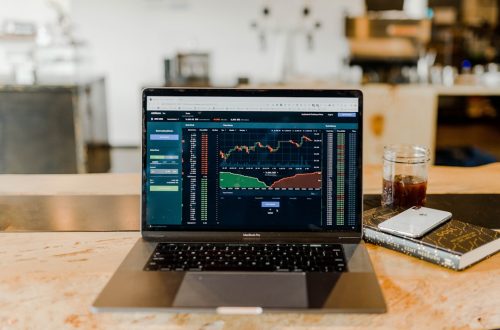Stock trading apps have revolutionized the way people invest in the stock market. With the rise of technology, these apps have made it easier than ever for individuals to buy and sell stocks right from their smartphones. These apps provide a convenient and accessible way for both beginners and advanced traders to manage their investments on the go. Whether you’re a seasoned investor or just starting out, there are a plethora of stock trading apps available to suit your needs. In this article, we will explore the features to look for in stock trading apps, as well as provide a comprehensive list of the top apps for both beginners and advanced traders. We will also compare fees and commissions, discuss security and customer support, and provide tips for choosing the right stock trading app for your investment needs.
Stock trading apps have democratized the stock market, allowing anyone with a smartphone to participate in buying and selling stocks. These apps provide a user-friendly interface that simplifies the process of investing, making it accessible to a wider audience. With the ability to research, trade, and manage investments all in one place, stock trading apps have become an essential tool for those looking to grow their wealth through the stock market. As the popularity of these apps continues to grow, it’s important for investors to understand the features to look for in a stock trading app, as well as the best options available for both beginners and advanced traders.
Key Takeaways
- Stock trading apps provide a convenient way for individuals to buy and sell stocks using their smartphones or tablets.
- When choosing a stock trading app, it’s important to look for features such as user-friendly interface, real-time market data, and educational resources.
- For beginners, top stock trading apps include Robinhood, Acorns, and Stash, which offer easy-to-use interfaces and educational tools.
- Advanced traders may prefer stock trading apps like TD Ameritrade, E*TRADE, and Interactive Brokers, which provide advanced charting tools and research resources.
- When comparing fees and commissions of stock trading apps, consider factors such as account minimums, trading fees, and commission-free trading options.
Features to Look for in Stock Trading Apps
When choosing a stock trading app, there are several key features to consider. First and foremost, ease of use is crucial. The app should have an intuitive interface that makes it easy to navigate and execute trades. Additionally, research tools and educational resources are important for both beginners and advanced traders. Look for apps that provide access to real-time market data, news, and analysis to help inform investment decisions. Another important feature to consider is the availability of a variety of investment options, including stocks, ETFs, options, and mutual funds. A good stock trading app should also offer customizable alerts and notifications to keep users informed about their investments.
Furthermore, security is paramount when it comes to stock trading apps. Look for apps that offer two-factor authentication and encryption to protect your personal and financial information. It’s also important to consider the app’s customer support options. Look for apps that offer responsive customer service through multiple channels, such as phone, email, and live chat. Finally, consider the app’s fees and commissions. While some apps offer commission-free trades, others may have fees that can eat into your investment returns. Consider your trading frequency and investment strategy when evaluating the fee structure of different apps.
Top Stock Trading Apps for Beginners
For beginners looking to dip their toes into the world of stock trading, there are several apps that cater specifically to their needs. Robinhood is a popular choice for beginners due to its commission-free trades and user-friendly interface. The app also offers fractional shares, making it easy for investors with limited funds to diversify their portfolios. Another top pick for beginners is Acorns, which is known for its “round-up” feature that automatically invests spare change from everyday purchases. Acorns also offers pre-built portfolios based on risk tolerance and investment goals, making it a great option for those who are new to investing.
Stash is another top stock trading app for beginners, offering a variety of educational resources and personalized investment guidance. The app also allows users to invest in themed ETFs based on their interests and values. For those interested in long-term investing and retirement planning, Betterment is a top choice. The app offers automated investing and portfolio management based on individual goals and risk tolerance. With low fees and personalized advice, Betterment is a great option for beginners looking to build wealth over time.
Top Stock Trading Apps for Advanced Traders
| App Name | Advanced Features | User Ratings |
|---|---|---|
| Thinkorswim | Advanced charting tools, customizable studies | 4.5/5 |
| Interactive Brokers | Direct market access, advanced order types | 4.3/5 |
| TradeStation | Customizable trading strategies, advanced analytics | 4.4/5 |
| NinjaTrader | Advanced charting, backtesting capabilities | 4.2/5 |
For advanced traders who are looking for more robust features and tools, there are several stock trading apps that cater to their needs. TD Ameritrade is a top choice for advanced traders due to its comprehensive research tools, advanced charting capabilities, and access to a wide range of investment products. The thinkorswim platform offered by TD Ameritrade is particularly popular among active traders for its customizable interface and advanced analysis tools.
Interactive Brokers is another top pick for advanced traders, offering low-cost trades and a wide range of investment options, including stocks, options, futures, and forex. The app also provides advanced trading tools and research resources for experienced investors. For those interested in international trading, Charles Schwab is a top choice due to its global presence and access to international markets. The app also offers advanced trading platforms and research tools for active traders.
For advanced traders who are interested in technical analysis and algorithmic trading, TradeStation is a top pick. The app offers advanced charting capabilities, customizable trading strategies, and access to a wide range of technical indicators. With low commissions and advanced order types, TradeStation is a great option for experienced traders looking for a powerful trading platform.
Comparing Fees and Commissions of Stock Trading Apps
When comparing fees and commissions of stock trading apps, it’s important to consider your individual trading frequency and investment strategy. Many stock trading apps now offer commission-free trades, making it more affordable than ever to invest in the stock market. However, some apps may have other fees to consider, such as account maintenance fees or inactivity fees. It’s important to carefully review the fee structure of each app to understand the total cost of investing.
In addition to commission fees, consider other costs such as margin interest rates, options contract fees, and mutual fund transaction fees. Some apps may also offer premium features or account tiers with additional fees. Consider whether these features are worth the extra cost based on your individual investment needs. Finally, consider any potential hidden fees or charges that may apply when using the app, such as foreign exchange fees or wire transfer fees.
Security and Customer Support in Stock Trading Apps

Security is paramount when it comes to stock trading apps, as they often contain sensitive personal and financial information. Look for apps that offer two-factor authentication and encryption to protect your account from unauthorized access. It’s also important to consider the app’s track record with security breaches and how they handle security incidents.
In addition to security measures, consider the app’s customer support options. Look for apps that offer responsive customer service through multiple channels, such as phone, email, and live chat. Consider the availability of customer support during market hours and how quickly they respond to inquiries or issues. It’s also important to consider the quality of customer support provided by each app, as well as any additional resources or educational materials they offer to help users navigate the platform.
Tips for Choosing the Right Stock Trading App
When choosing the right stock trading app for your investment needs, it’s important to consider your individual goals and preferences. Consider your level of experience with investing and what features are most important to you. If you’re a beginner, look for an app that offers educational resources and guidance to help you get started. If you’re an advanced trader, look for an app that offers advanced research tools and trading capabilities.
Consider your investment strategy and how frequently you plan to trade. If you’re a long-term investor who plans to buy and hold stocks, look for an app with low fees and a user-friendly interface. If you’re an active trader who plans to make frequent trades, look for an app with advanced charting capabilities and customizable order types.
Finally, consider the overall user experience of each app. Look for an app with an intuitive interface that makes it easy to navigate and execute trades. Consider the availability of mobile features such as customizable alerts and notifications to keep you informed about your investments on the go.
In conclusion, stock trading apps have revolutionized the way people invest in the stock market by providing a convenient and accessible way to manage investments on the go. When choosing a stock trading app, it’s important to consider key features such as ease of use, research tools, investment options, security measures, customer support options, fees and commissions. By carefully evaluating these factors and considering your individual investment needs, you can choose the right stock trading app to help you achieve your financial goals.
FAQs
What are stock trading apps?
Stock trading apps are mobile applications that allow users to buy, sell, and trade stocks directly from their smartphones or tablets. These apps provide access to stock markets, real-time quotes, financial news, and research tools.
How do stock trading apps work?
Stock trading apps work by connecting users to online brokerage accounts, where they can place orders to buy or sell stocks. Users can monitor their portfolio, track market trends, and execute trades in real-time through the app.
What are the benefits of using stock trading apps?
Some benefits of using stock trading apps include convenience, accessibility, real-time market data, research tools, and the ability to trade on the go. These apps also often offer low fees and commissions compared to traditional brokerage firms.
What are some popular stock trading apps?
Some popular stock trading apps include Robinhood, TD Ameritrade Mobile, E*TRADE, Fidelity, Charles Schwab, and Interactive Brokers. These apps offer a range of features and services for both beginner and experienced traders.
Are stock trading apps safe to use?
Stock trading apps offered by reputable brokerage firms are generally safe to use. It’s important for users to choose apps from trusted and regulated companies, and to take precautions to secure their accounts and personal information.
What should I consider when choosing a stock trading app?
When choosing a stock trading app, consider factors such as fees and commissions, available investment options, research and analysis tools, user interface and experience, customer support, and the app’s security measures.



